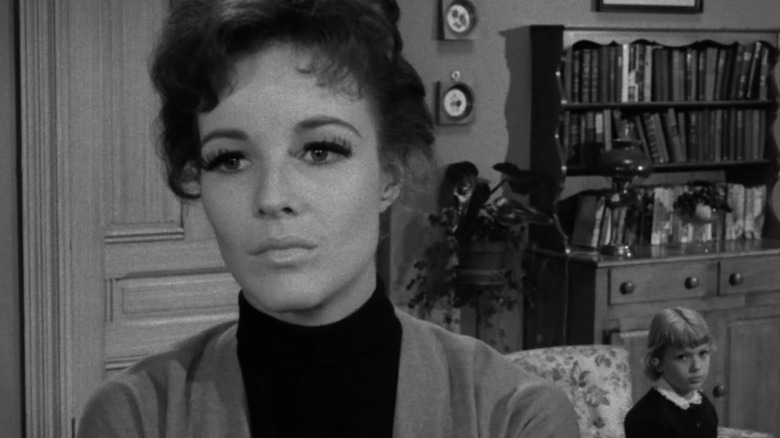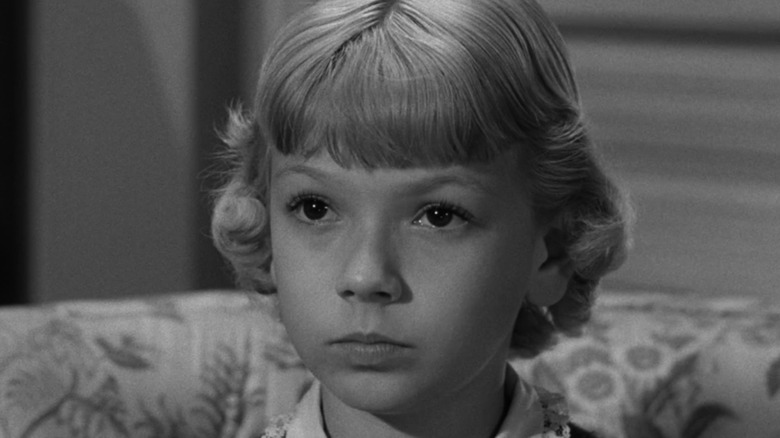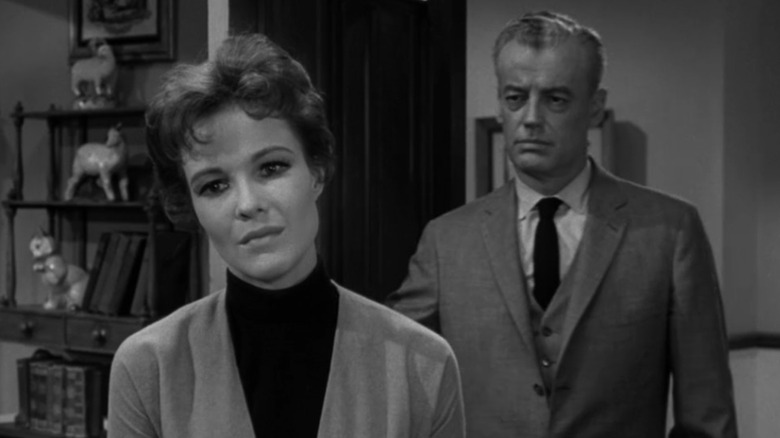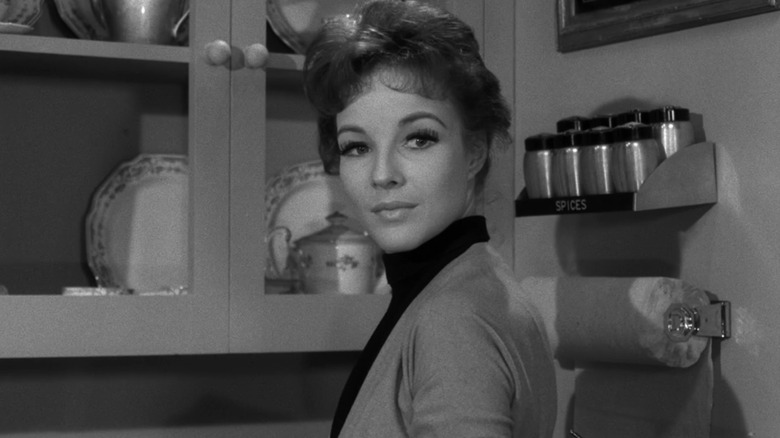A Forgotten Twilight Zone Episode Explores The Horror Of Repressed Memories
"Nightmare as a Child" isn't the best episode of "The Twilight Zone," or even the fifth or sixth best. On IMDb, the episode has the 93rd slot when ranking by user ratings, putting it in the lower half of the series' 153-episode run, while Paste's ranking puts it in a more generous 45th position. The episode, which appears late in the show's first season, could be more tightly plotted and punctuated with stronger lines, but it still deserves far more credit than it gets. "Nightmare as a Child" is actually one of the most upsetting episodes of the entire mind-bending series, as it examines a human phenomenon that's far more disturbing than aliens or robots: repressed memories.
The episode tells the story of Helen Foley (actress Janice Rule, who appropriately went on to become a psychotherapist), a teacher who meets a precocious and unsettling little girl (Terry Burnham) on the stairs outside her apartment. We know little about Helen except that she loves kids, and that's perhaps by design; after she offers the girl a cup of hot cocoa, Helen meets another stranger, a friend of her mother named Peter Selden (Shepperd Strudwick) to whom she confirms that she suffers from some memory problems. It's not that Helen has a bad short-term memory, but that, as she explains, some events from her childhood are hazy due to the shock she experienced. When Selden casually references Helen's mother's murder, she seems surprised, as if she'd only been dimly aware that it happened.
I'm you!
The plot twist in "Nightmare as a Child" isn't particularly surprising on its own, largely because it's alluded to throughout the episode before Helen finally gets a clue. The girl in her apartment likes her hot cocoa the same way Helen does, has the same burn scar on her arm that Helen has, and shares her childhood nickname — Markie. It's only after she sees a photo of herself as a child, and Markie blurts out "I'm you!" again and again, that Helen understands: a specter of a past self she barely recognizes has come back to warn her about a present danger. She catches on just in time, and sends her mother's killer, Selden, tumbling down the stairs.
Helen may be slow on the uptake ("You were doing so well, Helen. You were starting to remember things," Markie says with exasperation at one point when her older self fails to put two and two together), but by episode's end, she's an empowering stand-in for abuse and trauma survivors everywhere whose minds have cordoned off bits of their lives for their own safety. The Rod Serling-written episode ultimately gives Selden a mundane motive, as he admits Helen's mother was going to tell police about money he stole while overseeing the books where she worked. Yet there are undercurrents of a more sinister motive for his crimes, too, as he also admits he had a crush on Markie when he lived down the hall — despite having been an adult man when she was a 10-year-old.
The episode subtly shatters taboos
Strudwick, 24 years Rule's senior, portrays an air of restrained and even self-justifying malice as Selden tells Helen, "You were an exceptionally beautiful child ... and you look so much like your mother, especially now. So much like your mother." While the concept of repressed memories in a traditional sense has been largely discredited, science shows that intense trauma — like, say, witnessing a murder or being put in inappropriately sexual or romantic situations — can still impact the way we store and recall our memories. A brief look of disgust flits across Helen's face when Selden admits his crush, but mostly, she seems ashamed she can't remember anything about the worst day of her life. Markie also hints that Selden saw Helen as an extension of her mother, describing the way Helen's mother died in front of her in her bedroom before saying emphatically: "The man looked at you. The man looked at you. Then you screamed so loud, Helen. You screamed so loud."
Serling had written often about human psychology before "Nightmare as a Child," and would continue to after. "The Twilight Zone" dealt with concepts like PTSD and depression when both topics were still considered largely taboo, and typically did so through the perspective of middle-aged male characters — haunted military men and down-on-their-luck businessmen. Extraordinarily, "Nightmare as a Child" breaks that trend to present a story of women's trauma and self-preservation with nuance and clarity in 1960 — decades before the concept of repressed memories became muddled by the Satanic Panic, and sixteen years before "Sybil," a much messier and more damaging on-screen portrait of fractured mental health, took the world by storm.
Horror and healing
Helen isn't a shell of her former self or a "broken" woman, as is the case with plenty of protagonists in film and TV facing similar circumstances. Instead, she's a competent, independent single woman who was brave enough to return to the city of her nightmares nearly two decades after she survived her mother's attack. She sees Selden on the street and doesn't recognize him, so her unconscious mind calls Markie to the forefront to help bring down the walls in her memory that once kept her safe. Now, to stay safe, she has to look at her worst memories straight-on. The fact that Helen, a brave survivor who thought her worst days were behind her, came face to face with the man responsible for her lifelong trauma and didn't even realize it was him makes "Nightmare as a Child" a truly unique horror story.
The episode's best quality is undoubtedly its optimism. Serling isn't satisfied to end with a bleak "gotcha" moment the way so many horror stories about forgotten trauma do, revealing the circumstances that led to the present day before piling on even more pointless suffering. At the episode's end, Helen hears a girl singing "Twinkle Twinkle Little Star" the way Markie had, but when she steps outside her apartment, it's a completely different child. She doesn't need Markie to guide her through the haunted corridors of her memories anymore, and she's worked through her trauma enough to see a happy girl without feeling dread, panic, or pain. This is a scary story, but it's also about the human capacity for healing. "You've got a lovely smile," Helen tells the girl on the stairs, and it's clear she means it. "Don't ever lose it."
If you or someone you know may be the victim of child abuse, please contact the Childhelp National Child Abuse Hotline at 1-800-4-A-Child (1-800-422-4453) or contact their live chat services.



